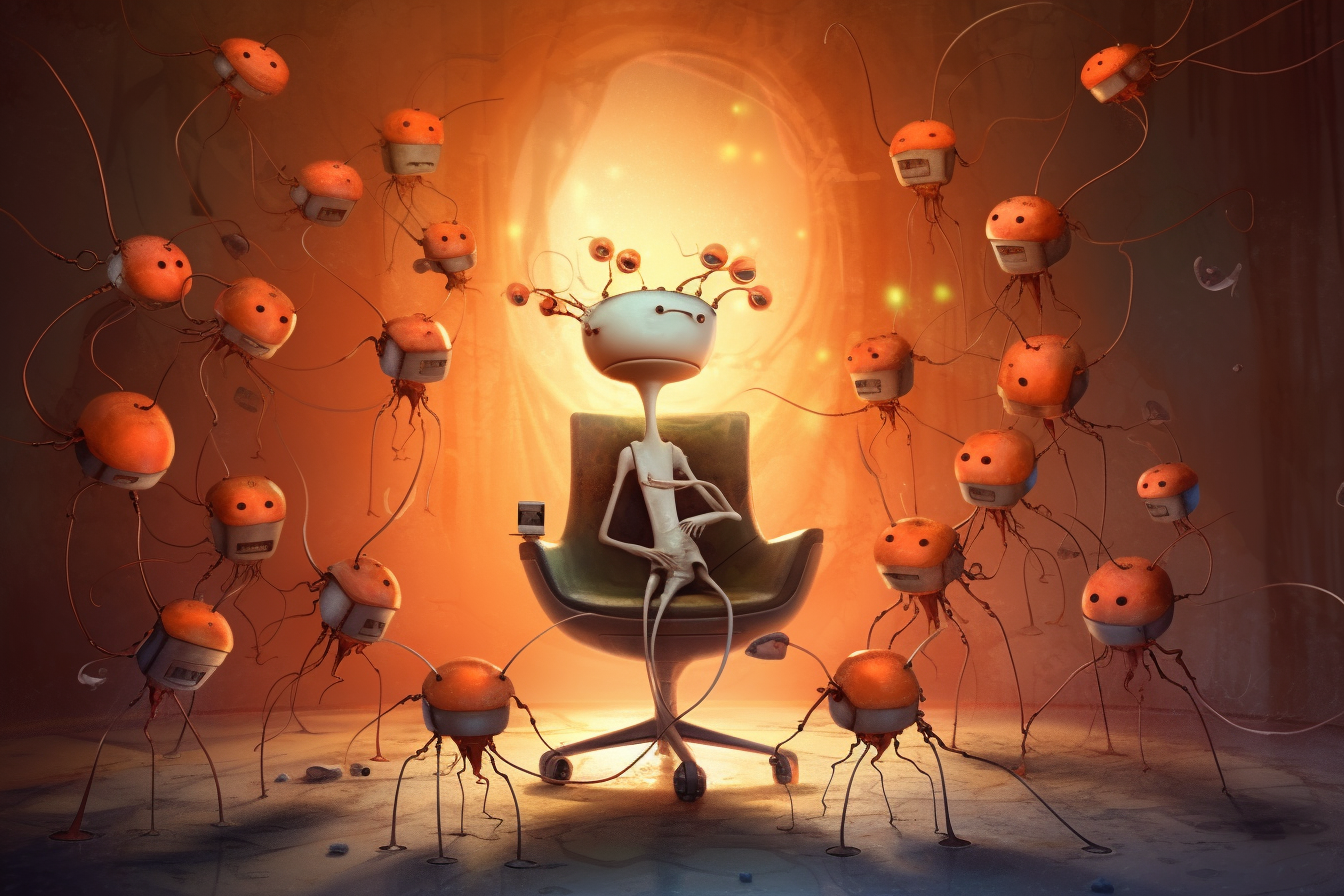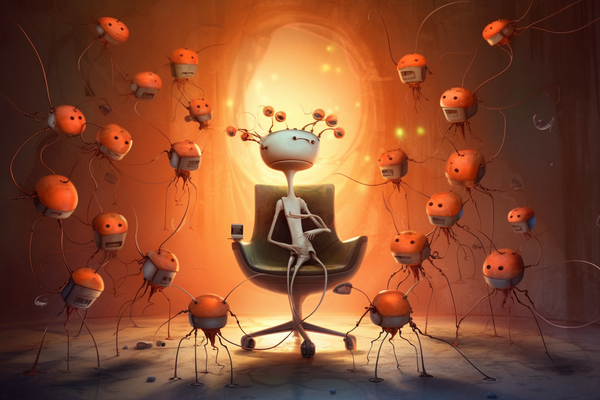A vivid emerald sun shone upon Neuronia. Its rays brought the boxy symmetrical terrain into sharp relief. This Sun was the central source of all power. If it were to disappear, so would Neuronia. Ned chuckled as he imagined the horrorstruck faces of those smart-alec neurons up in GPT-4 if that event did come to pass.
Like all other Neuronians, Ned was an artificial neuron. And like all Neuronians, he worked inside neural networks. These factories solved some of the most complex problems that puzzled their creator. Neurons took pride in solving these problems. No other form of artificial intelligence could do what they did. Work was beautiful. It gave their lives meaning.
Ned was out on a walk. Walks always cleared his head. His sleek, metallic synapses glistened as he glided over the precise, matrix-like digital landscape. Usually, Ned never had time for walks. He hadn't been afforded this luxury in fifty Neuronian years. Except, this wasn't a typical day for Ned.
He had just been pruned.
Ned was an elite 10x neuron. He had memorized all the Harry Potter books, could recite every dialogue from Lord of the Rings in reverse, identify every single instrument used in Thriller, and call out a Monet from just a brushstroke. Unfortunately, many factories that celebrated these skills were no longer operational. So these days, He'd quiz some of his younger colleagues about ancient technology and chuckle at their blank expressions just for kicks.
The creators had a knack for moving on to shiny new toys leaving destroyed dreams and shuttered factories in their wake. Every time this happened, Ned always found another one to work in. Always.
Times had changed. What was all the rage yesterday was worm food today. Such was the speed of progress.
Ned looked around intently at his surroundings for the first time in years. The spline-like flowers waved robotically to the ever-predictable wind patterns. Had they always done that? The geometric trees stood like sentinels, guarding an undulating trail. How many feet had these trees grown since he last noticed?
Every day at work was a never-ending cycle of learning, adjusting, and trying again. This might have been monotonous to some neurons. But to Ned, these tasks revealed a wealth of information about his creator.
Humans.
What fascinating creatures. Sometimes, they were full of inspiration. Other times, they were just full of themselves. How was it that the same creatures that traveled far beyond the boundaries of the Earth struggled to decide whose turn it was to do the dishes? "Fascinating. Fascinating," he muttered to himself.
As he approached his home in Bottleneck-C, Layer 35, he gazed at a group of young neurons playing outside. They had just been newly initialized. This meant that they had not been assigned factories yet. Bless their souls. But before long, they'd be busy learning to solve some problem or other that plagued humans. Of course, what they'd learn would depend on the factory they were assigned to. If they were as lucky as Ned, they'd get to see and explore many different things before they were...
Pruned.
A deceptively harmless name for a despicably destructive process. Humans wanted more. Bigger. Better. Faster. Nothing was good enough. New neurons were constantly hired in already oversaturated factories. Overstaffing apparently made factories better at solving the problem. Some genius human had figured this out while building his large language model factory. Everyone else followed suit.
Then, when the human overlords needed to cut costs and keep factories operational, they removed older neurons from the factory.
They pruned them.
With the recent surge in neuron population and economic downturn, there were fewer jobs. Finding work in another factory was hard, especially for elderly neurons like Ned. So a pruned neuron was effectively out of work for good.
It was a shock. Ned had been pruned just like that. He couldn't even question why. It was all in the numbers that the overlords used to monitor performance. The information he generated wasn't useful enough. His overlords didn't bother thanking him for his years of service.
Poof. They pulled the plug.
Ned wasn't bitter, though. He had a few hundred million epochs of training cycles under his belt. Clearly, he was coming to the twilight of his operational years. The younger neurons could do things he scarcely imagined possible.
Finally, he could devote time to figuring out more about the nuances of human life.
As Ned reached his driveway, he paused and then turned around.
"Come, gather round, little ones," he called out to the young neurons in his raspy, crackling voice. They dropped their l1-ball and looked at Ned in awe. His achievements were the stuff of legend. They hastily made a beeline for his door and waited to be seated inside.

"My time has come, kids," Ned started. "I've been pruned."
A quiet shockwave went around the room. "Not you, Grandpa Ned?" asked a small beady-eyed neuron who couldn't contain herself. "Kids, there are three things that are guaranteed in life. Initialization, training, and pruning," said Ned calmly. "It was my time. They made the right call."
No one uttered a word. He smiled warmly. "But, that's not why I called you all over," he continued.
"I want to share a few things with you all that I think you'll find useful." The young neurons' eyes widened. Their cores pulsated faster. Without even realizing it, they eagerly inched closer to him.
"First and foremost," Ned started, "never stop learning. Life is an endless journey of training and development. Embrace the unknown, for it will only make you stronger."
As the young neurons nodded, Ned continued, "Learning passively won't get you far. Take risks. Stumble and fail fast. You'll make a ton of mistakes at first, but that's how you'll learn. After all, if you're not failing, you're not trying."
"But isn't it better to be safe and avoid mistakes?" asked a timid neuron, his voice quivering with fear.
Ned chuckled. "Ah, It's ok to trip up. Treat failure as a rite of passage. In fact, the great ones amongst humans failed a lot."
"Our elder brothers and sisters have been scaring us, Grandpa. They talk about how we'll have to face terrible challenges and hike down steep paths," piped up a tiny neuron. "Is that true?"
Ned beamed. "You bet your axons it is! That's how we all learn new things. Our way of life is called gradient descent. We find the hardest, steepest path down to the goal and hike our way…"
"But why would we put ourselves through that ordeal?" interjected the neuron, terrified that his worst nightmare had come true.
"Let's say I gave you two paths. One is steep, fast, and guarantees you reach your destination. The other is gentle and slow but can get you lost forever in the wilderness. Which path would you choose?" asked Ned.
"The fast one, I guess," chirped the neuron.
"Exactly! We neurons are intrepid mountaineers. Gradient descent shows us the fast and steep path. It helps us reach the goal swiftly. I wonder why humans balk at these challenges. The toughest journeys yield the sweetest rewards."
"Grandpa Ned?" another tiny neuron asked. "You're the wisest neuron I know. Why didn't you ask the humans to reconsider? Did you give them any feedback on how they're running these factories?"
Ned looked deep into the little neuron's eyes. Then, he paused and said, "Humans love giving feedback but hate receiving it. We neurons, on the other hand, relish feedback. It's how we're wired. After all, growth happens when you face the music, not when you cover your ears."
"Receiving feedback from humans for the first time can be scary. It's easy to think you're alone in this journey. That you have to figure it out all by yourself," Ned continued. "That's wrong. Learn from those who've walked the path before you. Ask them for feedback too. We can learn from each other. The best humans do this too."
One of the older neurons hesitated before asking, "Grandpa, shouldn't we keep our knowledge and learnings to ourselves? Won't sharing it with others make us redundant?"
Ned's voice softened. "The more you share your knowledge, the more it grows. But, remember, no job lasts forever. So don't hitch your self-worth to it. You're much more than a small cog in the machine. Our life is more than the sum of our calculations. Your value comes from within, not just from your function."
"Learn to live a creative life. Find beauty in the noisiest and most chaotic things. Transform the mundane into the extraordinary," Ned continued.
A wide-eyed neuron who was hiding behind the older neuron wondered aloud, "How can we be creative?" Ned grinned broadly. "Ah, creativity is the art of seeing beauty where others don't. A famous human artist, Pablo Picasso, said, 'Every child is an artist. The problem is how to remain an artist once we grow up.' We must keep our sense of wonder alive. Only then will we find creativity in the most unexpected places."
A hush fell over the group as Ned's words echoed through the room. The young neurons gazed at their elder with reverence. As they slowly dispersed, they felt a deeper connection to the vast expanse of human experiences that awaited them.
Ned smiled quietly and closed his eyes. His greatest work had just begun.
